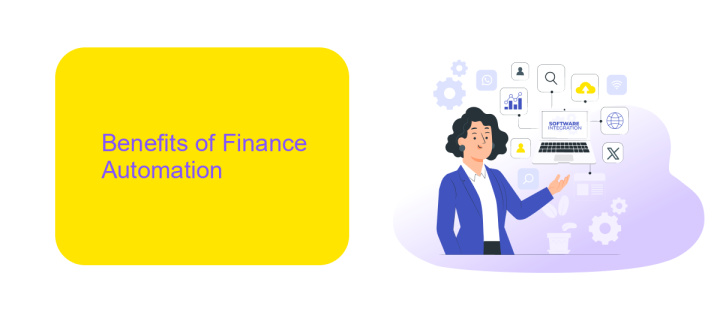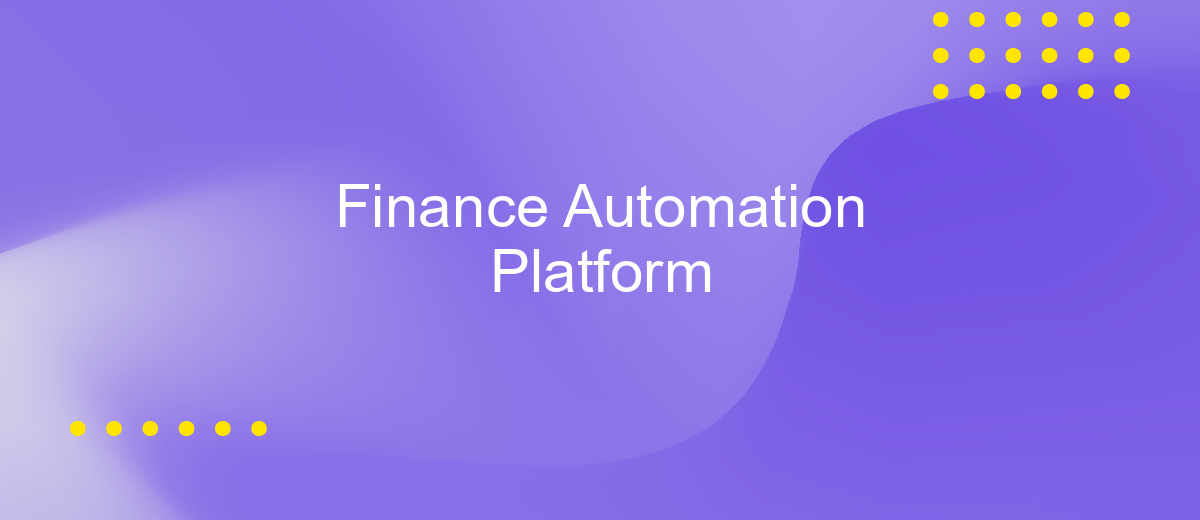Finance Automation Platform
In today's rapidly evolving financial landscape, businesses are increasingly turning to finance automation platforms to streamline operations and enhance accuracy. These innovative solutions integrate advanced technologies such as artificial intelligence and machine learning, enabling organizations to automate repetitive tasks, reduce human error, and gain real-time insights. By leveraging finance automation, companies can optimize resource allocation, improve decision-making, and maintain a competitive edge in the dynamic market environment.
Introduction
In today's rapidly evolving financial landscape, businesses are increasingly turning to automation to streamline operations, enhance accuracy, and drive efficiency. A Finance Automation Platform offers a comprehensive solution by integrating various financial processes into a unified system. This enables organizations to manage tasks such as invoicing, budgeting, and reporting with minimal manual intervention, thereby reducing errors and saving valuable time.
- Automated transaction processing
- Real-time financial reporting
- Seamless integration with existing systems
- Enhanced data security and compliance
- Scalable solutions for growing businesses
Adopting a Finance Automation Platform not only optimizes financial workflows but also empowers businesses with actionable insights through data analytics. By leveraging advanced technologies, companies can make informed decisions, improve cash flow management, and maintain a competitive edge in the market. As financial operations become more complex, automation platforms are crucial in ensuring that businesses remain agile and responsive to changing economic conditions.
Benefits of Finance Automation

Finance automation offers numerous advantages, streamlining complex processes and enhancing operational efficiency. By automating repetitive tasks, organizations can significantly reduce the time and effort required for financial management, allowing teams to focus on strategic decision-making. Automation minimizes human error and ensures accuracy in financial data, leading to more reliable reporting and compliance with regulatory standards. Furthermore, finance automation platforms can easily scale with business growth, adapting to increased transaction volumes without the need for additional resources.
Integrating various financial systems is another key benefit of finance automation. Platforms like ApiX-Drive facilitate seamless integration between different financial tools and services, enabling real-time data exchange and improved collaboration across departments. This connectivity ensures that all stakeholders have access to up-to-date financial information, fostering informed decision-making and strategic planning. Additionally, automated systems provide valuable insights through advanced analytics, helping businesses identify trends and optimize financial performance. Ultimately, finance automation empowers organizations to operate more efficiently and make data-driven decisions that drive long-term success.
Key Considerations for Choosing a Finance Automation Platform

When selecting a finance automation platform, it is crucial to ensure that it aligns with your organization’s specific needs and goals. The right platform can significantly enhance efficiency, accuracy, and compliance, but choosing the wrong one can lead to costly disruptions. Therefore, careful evaluation and strategic decision-making are essential.
- Scalability: Ensure the platform can grow with your business, accommodating increased transaction volumes and expanding financial operations without compromising performance.
- Integration: Check that the platform seamlessly integrates with your existing systems, such as ERP, CRM, and other financial tools, to ensure a smooth flow of information.
- Security: Prioritize platforms with robust security measures to protect sensitive financial data from breaches and unauthorized access.
- User-Friendliness: Opt for a platform that is intuitive and easy to use, minimizing the learning curve for your team and reducing the need for extensive training.
- Cost: Evaluate the total cost of ownership, including initial setup, ongoing maintenance, and potential hidden fees, to ensure it fits within your budget.
Ultimately, the ideal finance automation platform should not only streamline operations but also provide valuable insights and analytics to support strategic decision-making. By considering these key factors, organizations can choose a solution that delivers both immediate benefits and long-term value.
Best Practices for Implementing a Finance Automation Platform

Implementing a finance automation platform can significantly enhance efficiency and accuracy in financial operations. However, to ensure a successful implementation, it's crucial to follow best practices that align with your organization's goals and capabilities.
Begin by conducting a thorough needs assessment to identify the specific financial processes that will benefit most from automation. This will help in selecting the right platform that meets your requirements and integrates seamlessly with existing systems.
- Engage stakeholders early to gain support and address concerns.
- Set clear objectives and key performance indicators (KPIs) to measure success.
- Invest in training for staff to ensure they are comfortable using the new system.
- Start with a pilot program to test the system on a smaller scale before full deployment.
- Continuously monitor and optimize the platform to adapt to changing needs.
Finally, ensure that you have a robust change management process in place. This will help in minimizing resistance and ensuring a smooth transition. By following these best practices, organizations can maximize the benefits of their finance automation platform, leading to improved financial management and strategic decision-making.


Future Trends in Finance Automation
The future of finance automation is poised to be revolutionized by advancements in artificial intelligence and machine learning. These technologies will enable systems to process and analyze vast amounts of financial data with unprecedented speed and accuracy, providing deeper insights and more accurate forecasts. As a result, businesses will be able to make more informed decisions, optimize their financial operations, and reduce human error. Additionally, the rise of blockchain technology is expected to enhance transparency and security in financial transactions, further driving the adoption of automated solutions.
Integration platforms like ApiX-Drive will play a crucial role in the seamless connection of various financial tools and systems. By simplifying the integration process, ApiX-Drive allows businesses to automate workflows without the need for extensive technical expertise. This democratization of automation will empower organizations of all sizes to leverage advanced financial technologies. Moreover, as regulatory environments evolve, finance automation platforms will increasingly incorporate compliance features, ensuring that businesses remain up-to-date with legal requirements. The combination of these trends will shape a more efficient, secure, and accessible financial landscape.
FAQ
What is a Finance Automation Platform?
How can a Finance Automation Platform benefit my business?
Is it difficult to integrate a Finance Automation Platform with existing systems?
What security measures are typically in place for Finance Automation Platforms?
Can small businesses benefit from using a Finance Automation Platform?
Strive to take your business to the next level, achieve your goals faster and more efficiently? Apix-Drive is your reliable assistant for these tasks. An online service and application connector will help you automate key business processes and get rid of the routine. You and your employees will free up time for important core tasks. Try Apix-Drive features for free to see the effectiveness of the online connector for yourself.

